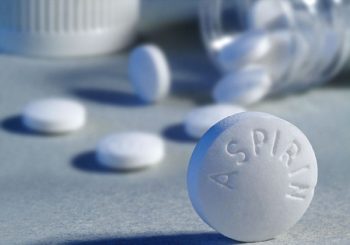By Sayer Ji
Contributing writer for Wake Up World
Once marketed by Bayer as “The wonder drug that works wonders,” aspirin’s profound toxicity and potentially deadly side effects can no longer be hidden from the public.
New cardiovascular disease prevention guidelines submitted jointly by the American College of Cardiology and the American Heart Associated and published in the Journal of the American College of Cardiology contradict decades of routine medical advice by explicitly advising against the daily use of low-dose or baby aspirin (75-100 mg) as a preventive health strategy against stroke or heart attack, in most cases:
“Aspirin should be used infrequently in the routine primary prevention of ASCVD (atherosclerotic cardiovascular disease risk) because of lack of net benefit.”
These changes in guidelines follow closely on the heels of three studies on daily aspirin use published in the New England Journal of Medicine that found the practice causes more harm than good to patients.
If you have been following our work over the years on revealing the unintended, adverse effects of both over-the-counter and prescription synthetic painkillers, you may already know that there have been over 50 adverse effects linked to aspirin usage, including deadly bleeding events.
The public’s general perception that aspirin is safe and effective is likely based on a widely held misunderstanding about its origin. Despite common misconceptions, aspirin is produced through chemical synthesis and is not the natural compound found in plants like willow bark known as salicylic acid; rather, it is known as acetyl-salicyclic acid which is not found in nature.
The GreenMedInfo Aspirin Toxicity Database
In a previous article titled, The Evidence Against Aspirin And For Natural Alternatives, we explore the implications of its semi-synthetic properties in depth:
“The chemical acetyl-salicylic acid, commonly known as aspirin, is a synthetic form of salicylic acid, a compound which is formed when salicin, a bitter compound naturally found within plants like white willow bark, is broken down within the human body. Salicylic acid can also be synthesized endogenously from benzoic acid, and its urinary metabolite, salicyluric acid, has been found to overlap levels in patients on low-dose aspirin regimens. Cell research indicates that salicylic acid compounds (known as salicyclates) actually compare surprisingly well to aspirin in reducing inflammatory activity.[2]
While salicylic acid is found naturally in plants as salicylates, acetyl-salicylic acid does not exist in nature, is not formed as byproduct of natural salicylate consumption,[3] and is produced only through industrial synthesis. For example, this is one method of synthesis:
Acetylsalicylic acid is prepared by reacting acetic anhydride with salicylic acid at a temperature of <90 deg C either in a solvent (e.g., acetic acid or aromatic, acyclic, or chlorinated hydrocarbons) or by the addition of catalysts such as acids or tertiary amines.”[4]
Also, the chemical modification of natural salicylic acid with an acetyl group results in the acetylation of hemoglobin,[5] essentially chemically altering the natural structure-function of our red blood cells and subsequent hemodynamics. In essence, aspirin, a semi-synthetic compound, makes the blood tissue itself semi-synthetic.
This could be why aspirin has been linked to such a broad range of unintended adverse health effects, including but not limited to:
Gastric Ulcer [6]
Hearing Loss/Tinnitus[7] [8] [9] [10] [11][12]
Cerebral Bleeding [13]
Influenza Mortality [14]
Reye Syndrome
Crohn’s Disease[15]
Helicobacter Pylori Infection[16]
We have a section on our database dedicated to indexing the under-reported, unintended adverse effects of aspirin, related to 50 diseases which can be viewed here: Aspirin Side Effects. We also have a section which indexes research on natural compounds studied to prevent, reduce or reverse Aspirin-Induced Toxicity.”
Are There Evidence-Based, Natural Aspirin Alternatives?
The quick answer is yes. We have reported on several, including turmeric, and one clinically validated natural alternative extracted from pine bark known as pycnogenol. Learn more by reading The Aspirin Alternative Your Doctor Never Told You About.
The more elaborate answer to the question is that heart disease and stroke are not caused by a lack of blood thinning agents, and therefore those looking for aspirin alternatives should be mindful of how this is essentially a superficial approach to mitigating disease risk. The point should be looking at the root causes of atherosclerosis and cardiovascular disease, and addressing and even reversing the conditions before they lead to potentially lethal changes in your physiology. We suggest further exploration of basic principles of nutrition (such as food as information), including looking at the role that the Western diet, calcium supplements, sunlight deficiency, and even statin drugs have in promoting heart disease. At least half the focus in preventing heart disease is simply removing their nutrition and lifestyle-based causes.
Additional Comment
As of March 19th, Bayer has yet to acknowledge these new findings in their marketing messages. In the screenshot from their website below, you can see they are still claiming their aspirin is a “live saving” WONDER DRUG, and claims it supports “heart health,” while “preventing stroke.”

Recommended articles by Sayer Ji:
- Toxic Massage: The Dark Side of A Highly Therapeutic Modality
- Consumer Alert: Tylenol’s Empathy-Killing Properties Confirmed in 2nd Study
- Magnesium Puts Psychiatric Drugs to Shame for Depression
- CDC Stats: Opioids Kill 4x More Than the Vietnam War; Natural Medicine is the Solution
- 8 Ways Microbes Can Save Us From Ourselves
- 6 Natural Ibuprofen Alternatives Backed by Clinical Research
- Brain Regeneration: Why It’s Real and How To Do It
- Beet Juice Boosts Cognitive Function In One Dose
- The Amazing Healing Properties of Apples
- 6 Bodily Tissues That Can Be Regenerated Through Nutrition
About the author:
Sayer Ji is the founder of Greenmedinfo.com, a reviewer at the International Journal of Human Nutrition and Functional Medicine, Co-founder and CEO of Systome Biomed, Vice Chairman of the Board of the National Health Federation, and Steering Committee Member of the Global Non-GMO Foundation.
For more, visit GreenMedInfo.com and Facebook.com/GreenMedInfo, or sign up for GreenMedInfo’s free e-Newsletter.
© January 31st, 2019 GreenMedInfo LLC. This work is reproduced and distributed with the permission of GreenMedInfo LLC. Want to learn more from GreenMedInfo? Sign up for their newsletter here.

If you've ever found value in our articles, we'd greatly appreciate your support by purchasing Mindful Meditation Techniques for Kids - A Practical Guide for Adults to Empower Kids with the Gift of Inner Peace and Resilience for Life.
In the spirit of mindfulness, we encourage you to choose the paperback version. Delve into its pages away from screen glare and notifications, allowing yourself to fully immerse in the transformative practices within. The physical book enriches the learning process and serves as a tangible commitment to mindfulness, easily shared among family and friends.
Over the past few years, Wake Up World has faced significant online censorship, impacting our financial ability to stay online. Instead of soliciting donations, we're exploring win-win solutions with our readers to remain financially viable. Moving into book publishing, we hope to secure ongoing funds to continue our mission. With over 8,500 articles published in the past 13 years, we are committed to keeping our content free and accessible to everyone, without resorting to a paywall.









